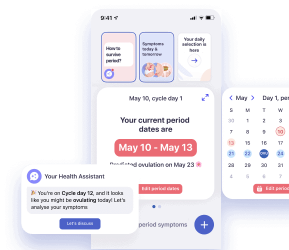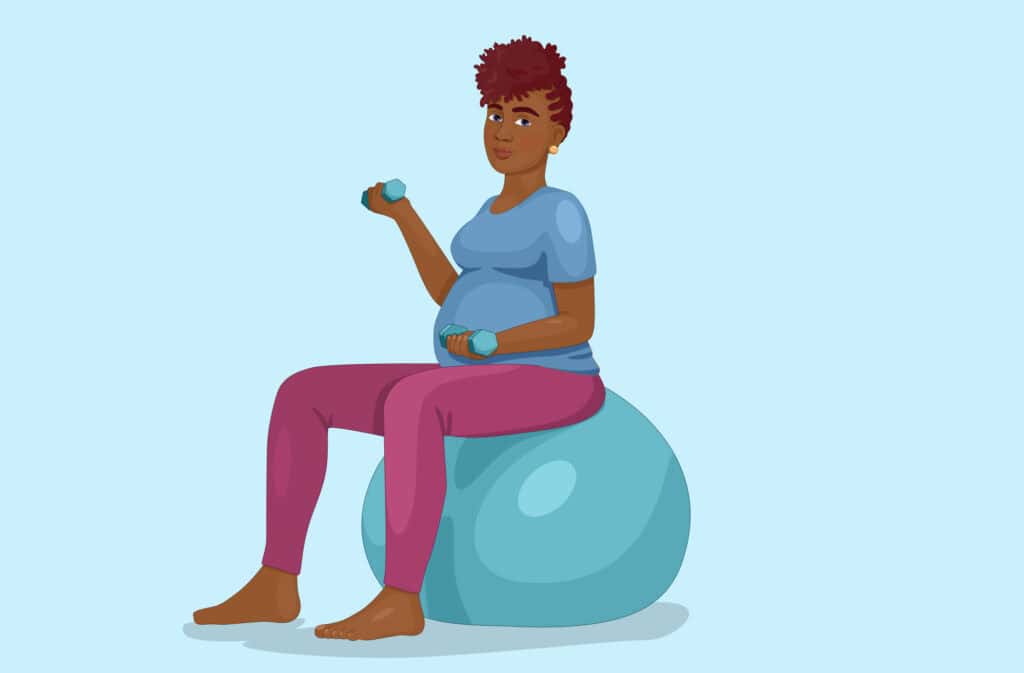Femia > Period calculator
Period сalculator
Being able to predict when your next period will arrive can save you a lot of hassle and help you to understand your own menstrual cycle





- Updated Feb 25, 2025
- Published
CRAFTED BY HUMAN
Crafted by human At Femia, we provide accurate and up-to-date information at every stage of your journey, from trying to conceive, pregnancy and postnatal support. All content is created by a real person based on in-depth research and own professional experience. Femia ensures that you will receive expert advice, strict accuracy and a personalized approach from our authors/medical experts. Learn more about our editorial policy.
FACT CHECKED
Fact checked At Femia Health, we maintain the highest standards of editorial excellence in delivering content focused on helping you conceive, guiding you through pregnancy, and supporting you postpartum. Explore our content review principles to learn how we ensure the accuracy and quality of our health and lifestyle tips for every stage of your journey.
Next period calculator
Period calculators predict when your next period will start by using simple information about your menstrual cycle.
Input the date of your last period, how long it lasted, and your cycle length to find out future period days and when you might ovulate.
How does a next-period calculator work?
A next-period calculator uses information about your menstrual cycle to tell you when your next period might start. It helps you to track your cycle and notice any irregularities or changes.
| Good to know |
|---|
| Period calculators are based on regular menstrual cycles. If the length of your period and menstrual cycle changes month to month then the predictor may not be the right tool for you. Have a read below to find out if you have a regular or irregular cycle, what can cause irregular periods, and when to seek help. |
Steps to calculate your next period:
Here’s what information the period calculator needs and why:
- The day your last period started. This will be used as a starting point to count from in order to predict when the next period is due.
- How long your period lasted. This will help calculate ovulation and when you’re most likely to be fertile.
- How long your menstrual cycle is. This is the number of days between the start of one period to the start of the next.
Example calculation:
If the first day of your period was January 1st, and your cycle normally lasts an average of 30 days, then your next period will start on January 31st.

Understanding your menstrual cycle:
According to the American College of Obstetricians and Gynecologists (ACOG), a typical menstrual cycle lasts around 28 days but anywhere from 21 to 35 days for adults is considered normal. It is also common for adolescent girls to have irregular periods for a while after starting their periods.
Here’s a quick breakdown of what happens during a typical menstrual cycle:
Menstrual phase (days 1–5). This is when you have your period. The lining of the uterus sheds if there’s no pregnancy. It typically lasts from three to seven days.
Follicular phase (days 1–13). Overlaps with menstruation and includes the time leading up to ovulation. Changing hormone levels cause follicles in the ovaries to grow. One follicle will mature into an egg.
Ovulation (around day 14). An egg is released by one of your ovaries, ready to be fertilized by a sperm cell. You’re most fertile around this time of your cycle.
Luteal phase (days 15–28). The egg travels down the fallopian tube and the uterus lining thickens in preparation for pregnancy. If the egg isn’t fertilized, hormone levels drop, and your next period starts.
Is your cycle regular or irregular?
Approximately 14–25% of women have irregular menstrual cycles. An irregular cycle can sometimes signal a health issue and make it harder to predict your period, ovulation, or fertile window. If you’re trying to get pregnant, having an irregular cycle can sometimes add extra challenges.
| Regular cycle | Irregular cycle |
|---|---|
| • Generally the same length each month
• Last between 21–35 days • Cycle length doesn’t fluctuate more than 7 days for 26–41 year olds. • Period calculators and fertility tracking apps are generally accurate and useful | • Varying lengths each month
• Might be very short (less than 21 days) or very long (more than 35 days) • Makes it very difficult to predict when your next period might start or when you will ovulate • May be caused by an underlying health condition or medication such as birth control |
How long is my cycle?
To calculate the length of your menstrual cycle, count how many days there are from the first day of your period to the start of your next period, but don’t include the first day of the next period.
For example:
- Your last period started on October 10th.
- Your next period arrived on November 7th.
- Your cycle length is 28 days.

ACOG states that a normal cycle length ranges from 21–35 days. If your cycles are consistently shorter or longer, they may be irregular. We recommend speaking with a healthcare professional for further assessment.
Factors affecting menstrual cycle regularity
How regular your menstrual cycle is can be influenced by a range of factors including lifestyle, medications, health conditions, and natural changes. Here’s a look at some of the most common causes of irregular periods:
Lifestyle:
- Stress. Increased stress levels can disrupt your hormones, causing irregular cycles.
- Diet and weight. Significant weight loss can disrupt your cycle. Extreme diets, low body weight, or low-calorie intake can cause you to stop ovulating and having periods.
- Exercise. Intense physical activity, especially in athletes, can disrupt hormones and make periods irregular. It can also affect your chances of getting pregnant.
Hormonal changes:
- Puberty and menopause. At these life stages, hormonal fluctuations can make periods unpredictable.
- Birth control. Some contraceptives can lighten or stop periods, while others may temporarily alter cycle length after starting or stopping them.
Health conditions:
- Polycystic Ovary Syndrome (PCOS). PCOS is a hormonal disorder that can lengthen cycles or cause missed periods due to irregular ovulation.
- Thyroid disorders. Both hypothyroidism (low thyroid hormone) and hyperthyroidism (high thyroid hormone) can impact menstrual cycle length and consistency.
| Understanding your cycle helps you to recognize your unique pattern and quickly notice any changes. If things seem off, talk to your healthcare provider— they can offer a personalized plan to help you regulate your cycle again. |
Why is my period late?
If your period is late, don’t worry—there are many possible reasons. First, use a period calculator to see if you’re actually late by entering the date of your last period and your average cycle length.
Common reasons for a late period:
- High-stress levels
- Change in diet or exercise
- Change in weight
- Pregnancy
- Natural changes due to perimenopause or puberty
- Hormonal conditions like PCOS
- Thyroid disease
If you’re sexually active, even if you use birth control, and your period is more than a week late, take a pregnancy test to make sure you aren’t pregnant.
If you’re not pregnant and your period is consistently late or irregular then it’s a good idea to check in with your healthcare provider for guidance.

Tips for more accurate period predictions:
- Track consistently. Regular logging of your period dates will help you understand your cycle and recognize any changes quickly.
- Use a period tracking app. Apps help calculate cycle length, fertile windows, log premenstrual symptoms, and generally make it easier for you to understand your own body.
- Don’t dramatically alter your diet or exercise routines. Gradual changes towards a healthy BMI are far better and more sustainable for your body than crash diets and extreme exercise plans.
Questions from the Femia community
How does birth control affect the accuracy of a period calculator?
Birth control can impact how accurate a period calculator is because some birth control methods can change your natural cycle, and can even halt your periods altogether. Most calculators are designed for natural cycles, so it's essential to consider this if you're on hormonal birth control.
Can my cycle length change over time?
Yes, cycle lengths can change over time. Stress, lifestyle changes, health conditions, or hormonal shifts can affect cycle length. Tracking consistently over a few months will help you notice any changes and understand what’s typical for you.
What should I do if my period is consistently irregular?
If your period is consistently irregular, it's a good idea to talk to your healthcare provider. They can help identify any underlying causes, like hormonal imbalances or health conditions, and recommend appropriate treatment or lifestyle changes to help regulate your cycle.
The bottom line
Period calculators are a great way to help you predict when your next period might start as well as what days you could be fertile. Tracking your cycle, menstrual symptoms, and when to expect your next period can help you to understand your body and feel more in control.
Next-period calculators work best for women who have natural, regular cycles. If you have noticed that your cycle is often irregular, then it’s worth having a chat with your healthcare provider. They can check for any underlying causes and help you find the best way to regulate your cycle.
References
- “Abnormal Uterine Bleeding.” ACOG, www.acog.org/womens-health/faqs/abnormal-uterine-bleeding.
- Aladashvili-Chikvaidze, Nutsa, et al. Types of Reproductive Disorders in Underweight and Overweight Young Females and Correlations of Respective Hormonal Changes With BMI. 1 Mar. 2015, pmc.ncbi.nlm.nih.gov/articles/PMC4426152/#:~:text=Even%20a%20moderate%20weight%20loss,and%20thus%20fertility%20(12).
- Department of Health & Human Services. “The Menstrual Cycle.” Better Health Channel, www.betterhealth.vic.gov.au/health/conditionsandtreatments/menstrual-cycle#phases-of-the-menstrual-cycle.
- “Menstruation in Girls and Adolescents: Using the Menstrual Cycle as a Vital Sign.” ACOG, www.acog.org/clinical/clinical-guidance/committee-opinion/articles/2015/12/menstruation-in-girls-and-adolescents-using-the-menstrual-cycle-as-a-vital-sign.
- Mussawar, Minhal, et al. “The Effect of Physical Activity on Fertility: A Mini-review.” F&S Reports, vol. 4, no. 2, Apr. 2023, pp. 150–58. https://doi.org/10.1016/j.xfre.2023.04.005.
- Poitras, Marilou, et al. “Bloody Stressed! A Systematic Review of the Associations Between Adulthood Psychological Stress and Menstrual Cycle Irregularity.” Neuroscience & Biobehavioral Reviews, vol. 163, June 2024, p. 105784. https://doi.org/10.1016/j.neubiorev.2024.105784.
- Polycystic Ovary Syndrome.” nhs.uk, 7 Mar. 2024, www.nhs.uk/conditions/polycystic-ovary-syndrome-pcos.
- “What Are Menstrual Irregularities?” https://www.nichd.nih.gov/, 31 Jan. 2017, www.nichd.nih.gov/health/topics/menstruation/conditioninfo/irregularities.
- Thiyagarajan, Dhanalakshmi K., et al. “Physiology, Menstrual Cycle.” StatPearls – NCBI Bookshelf, 27 Sept. 2024, www.ncbi.nlm.nih.gov/books/NBK500020.
- “Thyroid Disease | Office on Women’s Health.” OASH | Office on Women’s Health, www.womenshealth.gov/a-z-topics/thyroid-disease#:~:text=Too%20much%20or%20too%20little%20thyroid%20hormone%20can%20make%20your,your%20ovaries%2C%20may%20be%20involved.
- Website, Nhs. “Irregular Periods.” nhs.uk, 1 Oct. 2024, www.nhs.uk/conditions/irregular-periods.
- American College of Obstetricians and Gynecologists. “Abnormal Uterine Bleeding.” American College of Obstetricians and Gynecologists, www.acog.org/womens-health/faqs/abnormal-uterine-bleeding.




